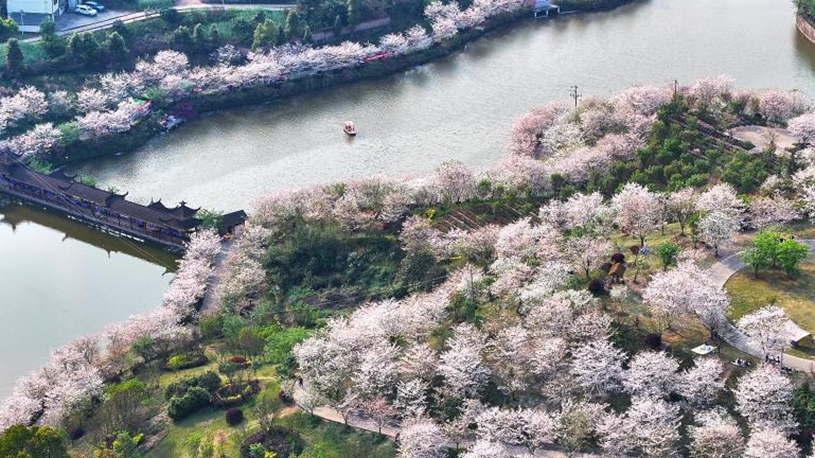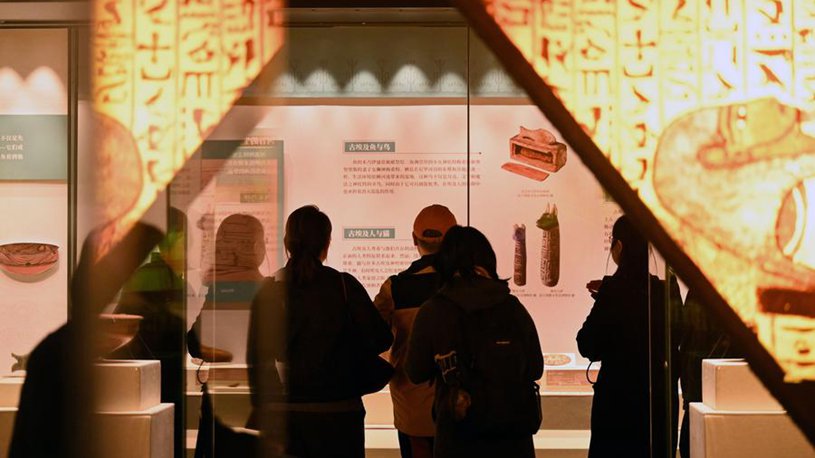
A flag-raising ceremony is held at the Golden Bauhinia Square by the Hong Kong Special Administrative Region (HKSAR) government to celebrate the 24th anniversary of Hong Kong's return to the motherland in Hong Kong, south China, July 1, 2021. (Xinhua/Lui Siu Wai)
"I have never felt so reassured," said a lawyer practicing in Hong Kong after Hong Kong's Safeguarding National Security Ordinance took effect on March 23.
HONG KONG, March 26 (Xinhua) -- Chan Tze Chin, a lawyer practicing in Hong Kong, heaved a breath of relief as he walked on the bustling street of Causeway Bay on March 23, the day Hong Kong's Safeguarding National Security Ordinance takes effect.
"I have never felt so reassured," he said.
The ordinance marks the completion of legislation work stipulated by Article 23 of the Hong Kong Special Administrative Region (HKSAR) Basic Law, plugging the national security loophole.
"Hong Kong starts anew from this day," HKSAR Chief Executive John Lee said on March 23. Many people in Hong Kong now share the sentiment.
PROMISING FUTURE
Chan was beaten by rioters in May 2020 when he tried to stop them from vandalizing a storefront.
Just as he was disappointed by Hong Kong's state of chaos at the time, the national security law in Hong Kong took effect in June that year, which put his life back to normal and inspired him to set up a social media channel for short videos about Hong Kong's legal environment.
"I wanted to dispel misunderstandings by explaining laws to more people," he said. Chan felt rewarded by the increasing number of viewer comments saying they are heartened by Hong Kong's improvement and are more confident in the future.

The Legislative Council (LegCo) of the Hong Kong Special Administrative Region (HKSAR) passes the safeguarding national security bill in a unanimous vote during the third reading in Hong Kong, south China, March 19, 2024. (Xinhua/Lui Siu Wai)hg
With the ordinance in effect, Chan hopes to contribute more to its publicity. "I will give lectures and attend international forums to tell stories and introduce to people the real Hong Kong."
Most of all, people should know that Hong Kong now has a stronger guarantee for security and a more stable society, which will help bring in investment, Chan said, adding that Hong Kong can concentrate on economic development.
SOW SEED OF PATRIOTISM
"It felt like welcoming a newborn," said Lee Chik, a primary school teacher and father of three, of how he has anticipated the ordinance.
Lee once stood up against rioters singing the national anthem together with his children. "The national anthem is my only weapon at hand to defend us," he said.
Lee has been exploring better ways to nurture patriotic sentiments among primary school students. He recalled watching the movie My Country, My Parents in class. Over half of the students ended up crying over the fathers who died on the battlefield defending the motherland, and many students learned to stand upright and sing the national anthem loudly in flag-raising ceremonies after watching the movie.
"I knew right away patriotism had settled in their minds," Lee said.
For his first-grader daughter, Article 23 legislation may be too difficult to understand, Lee said, adding that through songs and stories, he cultivates love for the motherland within his daughter.

John Lee, chief executive of the Hong Kong Special Administrative Region (HKSAR), attends a press conference on "Safeguarding National Security: Basic Law Article 23 Legislation Public Consultation" held at the HKSAR government headquarters in Hong Kong, south China, Jan. 30, 2024. (Xinhua/Lui Siu Wai)
PASSIONATE YOUTH
"Completing Article 23 legislation is truly a historic moment for Hong Kong," said Angel Chong, 23, a member of Sai Kung District Council. "I understand, through personal experience in public services, that safety and stability matters greatly to every Hong Kong resident."
When the safeguarding national security bill was being deliberated, Chong noticed voices of confusion or even defamation toward it, and decided to appear in a video series to expound on it in English.
Now she is planning activities in schools to help students know more about the ordinance and strengthen their sense of responsibility on safeguarding national security.
Chong's passion in public service can be traced back to her years studying in Peking University, where she was an active participant of seminars on Hong Kong's social causes. Over the years, she has sought to create a stronger bond among various social groups as she went through a long line of primary-level posts.
Chong believes that Hong Kong can focus on developing its economy and improving people's lives with security ensured. "I'm more motivated to serve the public to create a better future," she said. ■










